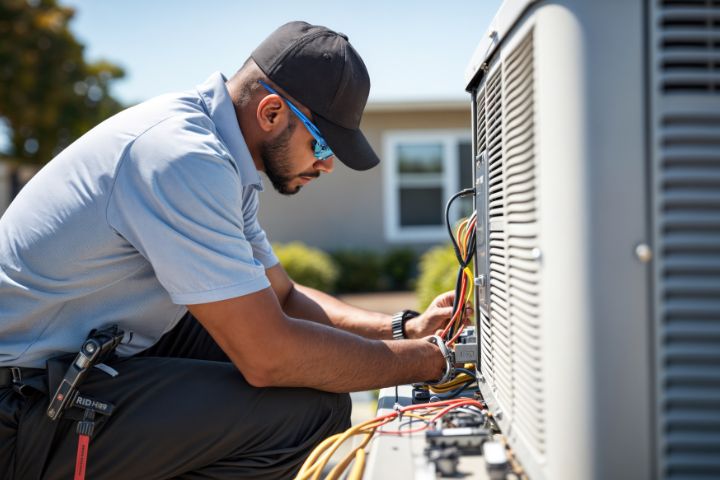HVAC technicians play a crucial role in our world, as they help keep homes and businesses comfortable year-round through heating, ventilation, and air conditioning services. When the air isn’t cooling in the summer or heating in the winter, people call on trained professionals to fix the problem.
These skilled workers install, maintain, and repair HVAC systems so buildings stay safe and comfortable. If you’ve ever thought about working in a hands-on trade that can offer steady demand, learning more about HVAC technician duties could help you decide if this career is right for you.
What is an HVAC Technician?
An HVAC technician is a trained professional who works on systems that control indoor climate and air quality. HVAC stands for:
- Heating: Servicing things like furnaces, boilers, heat pumps
- Ventilation: Working on ductwork, fans, and airflow systems
- Air Conditioning: Servicing things like central AC units, split systems, and cooling systems
Some technicians work on all three areas, while others may focus on certain types of equipment or specialize in residential or commercial systems. An HVAC repair technician often responds to calls when something goes wrong, while installation specialists focus on setting up new systems.
Regardless of their specialty, HVAC technicians use their skills to ensure systems work efficiently, safely, and reliably.
Core duties of an HVAC Technician
While daily tasks can vary, most HVAC technician duties fall into five main categories:
- Installation of HVAC systems
- Maintenance and upkeep
- Repair and troubleshooting
- System upgrades and retrofitting
- Customer interaction and education
Let’s dive into a little more of these duties and how HVAC repair technicians may work in these areas in their day-to-day routine.
Installation of HVAC systems
One of the primary jobs of an HVAC technician is installing new systems. This includes:
- Reading blueprints and technical diagrams
- Measuring and cutting ductwork
- Connecting electrical wiring and control systems
- Installing units like furnaces, air handlers, or condensers
Proper installation is essential for efficiency and safety. An HVAC technician must follow building codes and manufacturer guidelines, so the system operates correctly from day one.
Maintenance and upkeep
Like cars, HVAC systems need regular maintenance to keep running smoothly. Preventive maintenance is one of the most important HVAC technician duties. It may include:
- Cleaning coils and filters
- Checking refrigerant levels
- Inspecting electrical connections
- Testing system performance
Routine upkeep can prevent costly repairs and extend the life of the system. Many HVAC technicians schedule seasonal maintenance visits in the spring and fall to prepare systems for heavy use.
Repair and troubleshooting
When a system stops working, an HVAC repair technician must figure out what’s wrong and fix it. Troubleshooting requires both technical knowledge and problem-solving skills. Common repair tasks include:
- Replacing faulty parts such as motors or capacitors
- Fixing refrigerant leaks
- Repairing thermostat issues
- Restoring airflow problems
A skilled HVAC technician can diagnose problems quickly to get the system back up and running with minimal downtime.
System upgrades and retrofitting
Technology in the HVAC industry is always advancing. Many customers want to improve efficiency, reduce energy bills, or switch to more environmentally friendly options. HVAC technicians often handle upgrades like:
- Installing programmable or smart thermostats
- Replacing older units with high-efficiency models
- Updating ductwork for better airflow
- Adding air purification or humidity control systems
Retrofitting can also involve adapting an existing system to meet new building codes or performance standards.
Customer interaction and education
HVAC technicians don’t just work with tools; they also work with people. Good customer service is a big part of the job. Technicians may:
- Explain repair options and costs
- Show customers how to use their systems
- Offer maintenance tips to prevent future problems
- Answer questions about energy efficiency or air quality
Clear communication helps build trust and ensures customers know how to get the most out of their HVAC systems.
Key skills every HVAC Technician needs
To succeed in the field, HVAC technicians need more than just technical knowledge. They must combine hands-on skills with strong problem-solving abilities and good communication. Some of the most important skills include:
- Mechanical aptitude: Comfort working with tools, machinery, and complex systems
- Attention to detail: Ensuring all work meets safety and quality standards
- Troubleshooting abilities: Quickly identifying and fixing problems
- Physical stamina: Handling heavy equipment, climbing ladders, and working in tight spaces
- Customer service skills: Communicating clearly and professionally with clients
- Time management: Balancing multiple service calls and projects
An HVAC technician career offers variety, stability, and the satisfaction of solving real-world problems. Whether installing a brand-new system or restoring comfort to a family’s home, HVAC professionals play a critical role in everyday life.
At Dorsey College, our HVAC training program can help students learn the technical skills and safety knowledge they need to get started. With hands-on training and guidance from experienced instructors, you can prepare for a career that’s always in demand. Click the button below to learn more!

